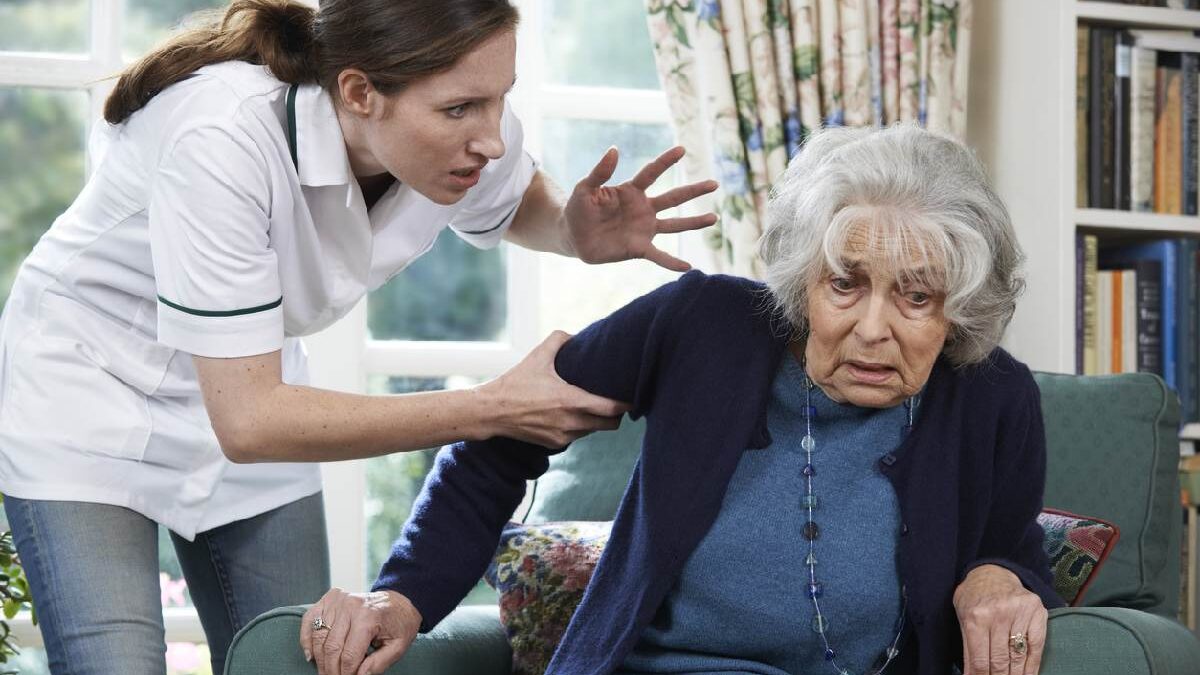Elder mistreatment often goes unnoticed, even by those close to individuals experiencing abuse. However, there are many signs of elder mistreatment that you should be aware of to protect elderly loved ones. Some signs may be easily dismissed, but if you know and love a senior, it’s your responsibility to become informed. Read on to learn some of the most common signs of elder abuse and what you can do to take action.
Table of Contents
1. Sudden Shifts in Behavior or Mood
We all have days where we feel in a funk, but a beloved elder’s sudden shifts in mood may be a red flag. Watch for changes in behavior that last more than a day or seemingly have no explanation. If your loved one is typically bubbly and excited when you visit their nursing facility but is now reserved and quiet, take note. An individual experiencing mistreatment or abuse may alter their behavior around their abuser, when the abuser is absent, or both.
Any change in mood or behavior is worth noting, but be mindful of how and when you ask questions. Abuse can incite feelings of shame, and the abused individual may resist sharing so as not to be a burden. Pay attention to shifts you observe, logging the date, time, and location of your observations. Be thorough, as details may prove helpful if you must later enlist the help of a nursing home abuse attorney.
Individuals experiencing caregiver abuse may become fearful of everything and everyone around them. They may become defensive, dismissive, or depressed, regardless of the situation in a given moment. Watch for responses that don’t align with their normal reactions to activities, people, and topics they enjoy.
2. Missing Medical Aids or Devices
Misplacing a pair of glasses may be commonplace across generations, but among the elderly, restricting access to devices constitutes abuse. If assistive items like glasses, hearing aids, or walkers are taken away, an individual’s autonomy is stunted. Abusers may take these things away to exert power or control or to commit further abuse.
Many older individuals rely on their caregivers’ support to assist them with mobility or ensure their daily needs are met. They trust those charged with caring for them to provide the assistance required, which also means giving up some or all agency. An abuser will use this access to an individual’s essentials to manipulate, torture, or threaten them with further abuse.
Abusers may also break medical aids or devices to make them unusable or uncomfortable to use in their broken state. They may also avoid getting items fixed, making excuses for not doing so or ignoring repair or replacement requests completely. Ask for updates on orders for new items and request documentation that normally would be submitted to the facility. If the caregiver can’t prove attempts to replace or fix the broken or missing items, follow up with facility leadership.
3. A Decline in Physical Condition or Appearance
Medication management and physical activity are important at any life stage and even more so for the aging. If a loved one has historically responded well to their treatments and suddenly declines, ask questions immediately. Abusers will restrict medication access, alter dosages, and make medication administration painful.
In caregiving arrangements, those entrusted with meeting an elderly person’s needs may abandon care standards. Bedpans may be left for days, wound dressings might not get changed, and the elder’s condition may deteriorate. Look for new cuts, bruises, and bed sores as indicators of physical abuse or neglect. Pay attention to overall physical changes, too, like weight loss and changes in the individual’s appearance, especially in the face.
Observe the caregiving space for indicators of food and water consumption or restriction. In a home setting, check the refrigerator and pantry for food and the trash for food-related waste. Make sure that food isn’t being thrown away directly in an attempt to mimic usage. If you suspect food restriction but don’t see evidence of such, ask for a food and water log to be maintained. If caregivers resist or the person receiving care doesn’t improve, abuse may be a factor.
4. Changes in Financial Habits or Willingness to Discuss Them
An individual’s access to and ability to manage their financial affairs may shift as they age. If memory, dexterity, or vision declines, an elder may rely on others to help them with their finances. While many — hopefully most — caregivers are trustworthy, some use their access to an elder’s accounts to conduct financial abuse and theft.
If bills suddenly aren’t being paid when the financial means should be available, financial abuse may be at play. Watch for large withdrawals and changes in deposit accounts and even authorized access. Abusers may make transactions without the elderly individual’s knowledge, or they may do so under false pretenses or with threats. They may take advantage of the older person’s reliance on their care to compel them to assume unwanted financial obligations.
When alone with your elderly loved one, ask about anything you’ve noticed, being careful with your words. Individuals who’ve been coerced into financial abuse may feel shame or embarrassment. Make sure your questions come from a helpful place. Investigate without judgment and offer to connect your loved one with legal or advocacy assistance.
Become an Advocate for the Elderly
We all play a role in protecting and advocating for the most vulnerable around us, including the elderly. Everyone deserves to be treated with respect, and when you’re a senior reliant on caregivers, vigilance from others is essential.
By learning the signs of mistreatment and knowing what to do if you suspect abuse, you can take necessary action. Assess caregiver situations at home, in nursing home facilities, and in hospitals for indicators of mistreatment. If you suspect abuse, speak up and get help immediately. The sooner you do, the sooner justice will be served.

